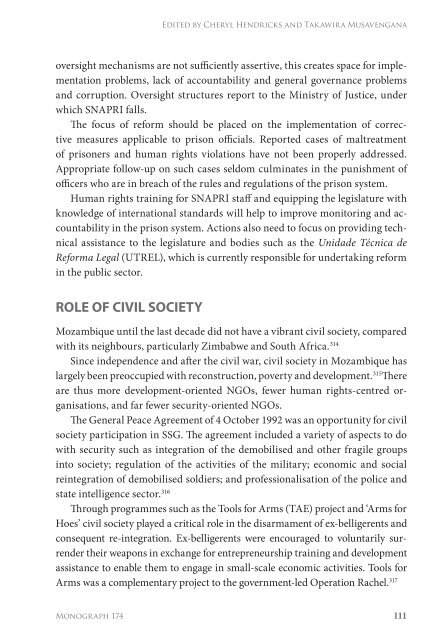5418 ISS Monograph 174.indd - Institute for Security Studies
5418 ISS Monograph 174.indd - Institute for Security Studies
5418 ISS Monograph 174.indd - Institute for Security Studies
Create successful ePaper yourself
Turn your PDF publications into a flip-book with our unique Google optimized e-Paper software.
Edited by Cheryl Hendricks and Takawira Musavengana<br />
oversight mechanisms are not sufficiently assertive, this creates space <strong>for</strong> implementation<br />
problems, lack of accountability and general governance problems<br />
and corruption. Oversight structures report to the Ministry of Justice, under<br />
which SNAPRI falls.<br />
The focus of re<strong>for</strong>m should be placed on the implementation of corrective<br />
measures applicable to prison officials. Reported cases of maltreatment<br />
of prisoners and human rights violations have not been properly addressed.<br />
Appropriate follow-up on such cases seldom culminates in the punishment of<br />
officers who are in breach of the rules and regulations of the prison system.<br />
Human rights training <strong>for</strong> SNAPRI staff and equipping the legislature with<br />
knowledge of international standards will help to improve monitoring and accountability<br />
in the prison system. Actions also need to focus on providing technical<br />
assistance to the legislature and bodies such as the Unidade Técnica de<br />
Re<strong>for</strong>ma Legal (UTREL), which is currently responsible <strong>for</strong> undertaking re<strong>for</strong>m<br />
in the public sector.<br />
ROLE OF CIVIL SOCIETY<br />
Mozambique until the last decade did not have a vibrant civil society, compared<br />
with its neighbours, particularly Zimbabwe and South Africa. 314<br />
Since independence and after the civil war, civil society in Mozambique has<br />
largely been preoccupied with reconstruction, poverty and development. 315 There<br />
are thus more development-oriented NGOs, fewer human rights-centred organisations,<br />
and far fewer security-oriented NGOs.<br />
The General Peace Agreement of 4 October 1992 was an opportunity <strong>for</strong> civil<br />
society participation in SSG. The agreement included a variety of aspects to do<br />
with security such as integration of the demobilised and other fragile groups<br />
into society; regulation of the activities of the military; economic and social<br />
reintegration of demobilised soldiers; and professionalisation of the police and<br />
state intelligence sector. 316<br />
Through programmes such as the Tools <strong>for</strong> Arms (TAE) project and ‘Arms <strong>for</strong><br />
Hoes’ civil society played a critical role in the disarmament of ex-belligerents and<br />
consequent re-integration. Ex-belligerents were encouraged to voluntarily surrender<br />
their weapons in exchange <strong>for</strong> entrepreneurship training and development<br />
assistance to enable them to engage in small-scale economic activities. Tools <strong>for</strong><br />
Arms was a complementary project to the government-led Operation Rachel. 317<br />
<strong>Monograph</strong> 174 111

















